
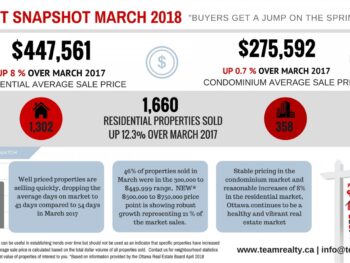
March Market Snapshot
Buyers Get a Jump on the Spring Market taken from the Ottawa Real Estate Board April 5, 2018 Members of the Ottawa Real Estate Board sold 1,660 residential properties in March through the Board’s Multiple Listing Service® System, compared with 1,478 in March 2017, an increase of 12.3 per cent. The five-year average for March sales is 1,339. March’s sales included 358 in the condominium property class and 1,302 in the residential property class. “Inventory continues to fall below normal average, but we are still seeing more sales than last year because listings are not staying on the market,” states Ralph Shaw, President of the Ottawa Real Estate Board. “Properties that are priced well are selling quickly with days on market dropping to an average of 43 days from an average of 54 days on market in March 2017.” The average sale price of a residential-class property sold in March in the Ottawa area was $447,561, an increase of 8 per cent over March 2017. The average sale price for a condominium-class property was $275,592, an increase of 0.7 per cent from March 2017. The Board cautions that the average sale price can be useful in establishing trends over time but should not be used as an indicator that specific properties have increased or decreased in value. The calculation of the average sale price is based on the total dollar volume of all properties sold. Price and conditions will vary from neighbourhood to neighbourhood. “The most active price point in the residential market continues to be the $300,000 to $449,999 range, accounting for 46 per cent of the market. In addition, the $500,000 to $750,000 market is a price point that is showing robust growth representing 21 per cent of the residential homes sold in March,” Shaw acknowledges. “In the condominium market, between $175,000 and $274,999 is the most buoyant price point, accounting for 51 per cent of the market. We continue to believe it is due to low interest rates and the lack of supply of rental inventory pushing renters into the market,” he adds. “Overall, as a result of the stable pricing in the condominium market and reasonable increases of 8 per cent in the residential market, Ottawa continues to be a healthy and vibrant real estate market,” Shaw concludes. In addition to residential and condominium sales, OREB Members assisted clients with renting 551 properties since the beginning of the year.
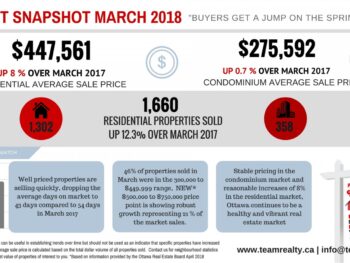
March Market Snapshot
Buyers Get a Jump on the Spring Market April 5, 2018 Members of the Ottawa Real Estate Board sold 1,660 residential properties in March through the Board’s Multiple Listing Service® System, compared with 1,478 in March 2017, an increase of 12.3 per cent. The five-year average for March sales is 1,339. March’s sales included 358 in the condominium property class and 1,302 in the residential property class. “Inventory continues to fall below normal average, but we are still seeing more sales than last year because listings are not staying on the market,” states Ralph Shaw, President of the Ottawa Real Estate Board. “Properties that are priced well are selling quickly with days on market dropping to an average of 43 days from an average of 54 days on market in March 2017.” The average sale price of a residential-class property sold in March in the Ottawa area was $447,561, an increase of 8 per cent over March 2017. The average sale price for a condominium-class property was $275,592, an increase of 0.7 per cent from March 2017. The Board cautions that the average sale price can be useful in establishing trends over time but should not be used as an indicator that specific properties have increased or decreased in value. The calculation of the average sale price is based on the total dollar volume of all properties sold. Price and conditions will vary from neighbourhood to neighbourhood. “The most active price point in the residential market continues to be the $300,000 to $449,999 range, accounting for 46 per cent of the market. In addition, the $500,000 to $750,000 market is a price point that is showing robust growth representing 21 per cent of the residential homes sold in March,” Shaw acknowledges. “In the condominium market, between $175,000 and $274,999 is the most buoyant price point, accounting for 51 per cent of the market. We continue to believe it is due to low interest rates and the lack of supply of rental inventory pushing renters into the market,” he adds. “Overall, as a result of the stable pricing in the condominium market and reasonable increases of 8 per cent in the residential market, Ottawa continues to be a healthy and vibrant real estate market,” Shaw concludes. In addition to residential and condominium sales, OREB Members assisted clients with renting 551 properties since the beginning of the year.
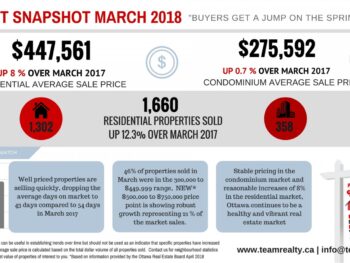
March Market Snapshot
Buyers Get a Jump on the Spring Market April 5, 2018 Members of the Ottawa Real Estate Board sold 1,660 residential properties in March through the Board’s Multiple Listing Service® System, compared with 1,478 in March 2017, an increase of 12.3 per cent. The five-year average for March sales is 1,339. March’s sales included 358 in the condominium property class and 1,302 in the residential property class. “Inventory continues to fall below normal average, but we are still seeing more sales than last year because listings are not staying on the market,” states Ralph Shaw, President of the Ottawa Real Estate Board. “Properties that are priced well are selling quickly with days on market dropping to an average of 43 days from an average of 54 days on market in March 2017.” The average sale price of a residential-class property sold in March in the Ottawa area was $447,561, an increase of 8 per cent over March 2017. The average sale price for a condominium-class property was $275,592, an increase of 0.7 per cent from March 2017. The Board cautions that the average sale price can be useful in establishing trends over time but should not be used as an indicator that specific properties have increased or decreased in value. The calculation of the average sale price is based on the total dollar volume of all properties sold. Price and conditions will vary from neighbourhood to neighbourhood. “The most active price point in the residential market continues to be the $300,000 to $449,999 range, accounting for 46 per cent of the market. In addition, the $500,000 to $750,000 market is a price point that is showing robust growth representing 21 per cent of the residential homes sold in March,” Shaw acknowledges. “In the condominium market, between $175,000 and $274,999 is the most buoyant price point, accounting for 51 per cent of the market. We continue to believe it is due to low interest rates and the lack of supply of rental inventory pushing renters into the market,” he adds. “Overall, as a result of the stable pricing in the condominium market and reasonable increases of 8 per cent in the residential market, Ottawa continues to be a healthy and vibrant real estate market,” Shaw concludes. In addition to residential and condominium sales, OREB Members assisted clients with renting 551 properties since the beginning of the year.

Buyers Toolkit – Springtime
Buyers Toolkit – Springtime Spring is in the air, and the real-estate market is ramping up for the beginning of buyers’ season. Things tend to move faster in the spring and houses for sale are often sold shortly after they are listed. As a potential home buyer, it is important to be prepared as possible before you start looking at potential homes – that way, the chance of losing your “dream home” to another buyer is greatly decreased. You may be wondering … “What are some of the important things that can help you stay on-top of, and ahead of this year’s spring market?” Have no fear, in this toolkit we have everything you need to know, and do, to make the buying experience go smoothly for you! Your “Tools”-What you want to be prepared with ahead of time: Mortgage Information & Pre-approval Find out what mortgage you qualify for, and get your mortgage pre-qualification. By taking this step you’ll know exactly what you can afford to buy and when you’re ready to make an offer, you can be confident knowing you are staying within your financial boundaries. A financing condition is pretty standard in an agreement of purchase and sale; after your offer is accepted by the seller the time you have to meet the conditions is best spent finalizing your financing on a specific property rather than starting the approval process. A Realtor Although that seems like a no-brainer, making sure you have hired the realtor who is right for you is very important when it comes to purchasing a home. Do some research, ask questions, interview a few realtors, check online profiles and reviews. You’ll be spending a lot of time with your real estate agent; make sure you trust them, that they’re knowledgeable and that you’re comfortable with them. Quick and easy contact with your agent is another key piece when it comes to signing and sealing a deal. Your List of Needs vs. Wants Knowing what you’ll need in your future home, and things that you want (your wish-list) is one of the most important aspects when it comes to looking for a new home. Needs are things that you must have in your new home (e.g. minimum number of bedrooms, a yard for the dog, a safe neighbourhood) whereas the wants’ or your “wish-list” are things you don’t necessarily need, but you’d like to have (Example: Granite countertops). Your “must-have” list will help you rule out homes for sale that aren’t suited for your needs rather than spending valuable time on those that don’t. This process can also open up your search options if some of the things on your need list actually turn out to be wants. Pro-Con List It’s important to keep a list of the pros’ and cons’ of each property that you visit, in order to have a better recollection of the home that is best suited for your family. Remember to check small details in each home, like testing the lights, and plumbing, and make note of the neighbourhood characteristics. Trust Your Gut When it comes to knowing what home is the right choice for you, you can use the simple tools listed above to help make an informed decision, however the most important aspect of home-buying is knowing when to trust your gut. The spring market moves quickly, and sometimes being prepared, and trusting your instincts are the two key factors standing between you, and successfully making an offer on your future home in time. If the potential home is in your price range, and has the combination of needs and wants you desire – don’t take the time to sleep on it, or you may lose the opportunity to make an offer. Trust your intuition and keep in close contact with your realtor to have the best support and knowledge while making these decisions. There are many different aspects that are key elements to finding the right home. Working with your realtor to negotiate for a fair price, finding the neighbourhood you’re comfortable with, and ensuring you have the right credit and down-payment for the home you’re interested in are just some of these factors. The home buying process doesn’t need to be complicated – tool kit in hand, and realtor by your side, will make this spring market a piece of cake for you. Let us know how we can help! Contact us info@teamrealty.ca

Landlords and Legalization: What budding weed laws may mean for Landlord
Landlords and Legalization: What budding weed laws may mean for Landlords With the legalization of marijuana on the horizon, property owners of rental units are wondering what that will mean for them. As all the rules and regulations surrounding cannabis use have yet to be ironed out, it’s only natural that landlords are beginning express concern, or in some cases excitement surrounding the opportunities legalization will present. The legalization of medical cannabis passed in 2001, but as Canada moves forward to legalize the use of cannabis across the country, there are many different views surrounding the changes. With multiple angles to consider, it’s no wonder that landlords across the country are beginning to question, challenge, and prepare for the pending legalization. What are the pro and con sides of the debate surrounding legalization for landlords, and how might rental properties be affected by the new legislation? Firstly, one of the stipulations surrounding the new legislations is that marijuana can only be smoked in private residences. With this stipulation, there are two clear opinions stemming from landlords surrounding the pending legalisations: Against – due to questions of property value, maintenance, and lack of control over their rental units For legalisation – viewing legalisation as an opportunity in the rental market, as there will be a need to fill Looking initially at those against legalization, and their concerns surrounding property values, costs of fumigation, and loss of control within their rental units, it is understandable why landlords are questioning how they will be able to control their properties once smoking weed becomes a legal right, contained to private residences. Much like how many landlords have clauses surrounding not allowing pets within their units, it is likely that there will be a surge in rental units that are anti-weed smoking, meaning that tenants are not permitted to smoke weed in these units. Although it is a tricky situation to regulate, as smoking weed is going to be a legal right, it is possible to see landlords increasing their rents, and tightening up conditions of leases in order to accommodate the new legislation and the costs that could be ensued. In the same way that landlords try and regulate the type and number of pets permitted in each unit, it is possible that they will attempt to make these same regulations surrounding marijuana in order to protect their property from damages, the need to fumigate, and to ensure the well being and happiness of al their tenants. A potential surge in rent increases could lead renters to be searching for weed-friendly apartments, (much like pet-friendly apartments), which could see a rise in vacancies in some places, along with some renters seeking out the option to purchase a private residence in order to enjoy their space freely, and as they see fit. On the other hand, some landlords are viewing this new legislation as an opportunity to take advantage of what will be a need in the market, much like those who take advantage of the need/want for pet-friendly rental options. The legalisation of marijuana opens a new need in the rental market for properties that will allow tenants to smoke, and grow their plants hassle free. With this opportunity, landlords can specialize their units with these new stipulations in mind, allowing those who wish to be able to smoke without hassle to find living arrangements that are both suitable, and enjoyable to them. With some landlords pushing to ban cannabis smoking in rental units, it is possible that cannabis users could end up with no where left to go, unless units like these exist. Although they may see a slight increase in the cost of renting these units, the ability to partake in cannabis use without issue is attractive to those seeking to exercise their legal rights. Much like those individuals who look specifically for rental units that allow pets, these tenants may result in fewer vacancies and longer tenancies, as the accommodations will be difficult to find with many landlords being against the new stipulations. Although the desire to smoke and grow cannabis would not be a requirement to live in a rental unit such as this, new tenants would have to be okay with the fact that the building does allow tenants to partake in their legal right, and therefore would minimize possible complaints surrounding smoke and pot smell. Although there is much to still be decided and ironed out in terms of details on these types of rental properties, it is certain to be a wise investment and a new opportunity to take advantage of within the market. The new legislation is a topic of discussion all around, surrounding use, growth, and ability to purchase marijuana, and it’s regulation. Landlords are preparing themselves for the coming changes, whether they are pro, or con, in terms of the new legislation and how their properties may change for existing and new tenants. It is possible there will be a rise in tenants seeking out marijuana friendly rental units, willing to pay premium prices for personal privacy and their ability to smoke hassle free.
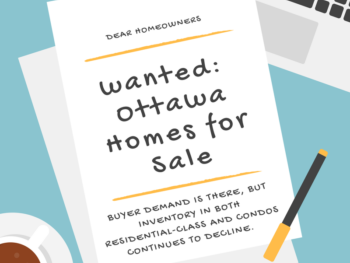
Wanted: Ottawa Homes for Sale
Wanted: Ottawa Homes For Sale When the calendar rolled over into 2018 many real estate experts across Canada were speculating the housing market to “cool off” with tighter mortgage rules and higher interest rates impacting home buyers. While that may be the case in other real estate markets, in the Ottawa Real Estate market the biggest factor in February’s 2.8% drop in the number of sales (year over year), is that listing inventory is scarce. “There is no doubt our sales number would have been much higher if we had more properties available for sale. Buyer demand is there, but our inventory in both residential class and condos continues to decline. This is creating a supply side issue in the Ottawa real estate market” -Ralph Shaw, OREB President The Ottawa Real Estate board’s recently released statistics show that home buyers are still actively searching for properties in spite of the low inventory, which is a trend that is continuing from 2017. F If the decrease in supply in both the residential and condo markets continues into the Spring, it may put an upward pressure on prices. If you are thinking of selling this is a great time to get your home on the market. Below we’ve included the latest news release from the Ottawa Real Estate Board. Please note: average sale price information can be useful in establishing trends over time but should not be used as an indicator that specific properties have increased or decreased in value. The average sale price is calculated based on the total dollar volume of all properties sold. We have access to current statistics and trends in our neighbourhoods and communities, it’s our job to stay on top of the market trends! We have up to date Real Estate Market Reports readily available for you and we love to chat real estate – contact us anytime! News Release Below: March 5, 2018 Posted by the Ottawa Real Estate Board Members of the Ottawa Real Estate Board sold 979 residential properties in February through the Board’s Multiple Listing Service® System, compared with 1,002 in February 2017, a decrease of 2.3 per cent. The five-year average for February sales is 922. February’s sales included 250 in the condominium property class and 729 in the residential property class. “There is no doubt our sales numbers would have been much higher if we had more properties available for sale. Buyer demand is there, but our inventory in both residential-class and condos continues to decline. This is creating a supply side issue in the Ottawa real estate market,” concludes Ottawa Real Estate Board President, Ralph Shaw. “If this trend continues, the market will move to favour sellers, and buyers will find themselves competing for a limited number of listings.” “Compounding the supply issue is the fact that after a record year last year, new construction is hindered getting to market because builders just cannot find enough land as a result of the urban boundary and land prices going up,” Shaw points out. “Given this environment, it’s a good opportunity for Sellers to get their property on the market,” he advises. The average sale price of a residential-class property sold in February in the Ottawa area was $429,600, an increase of 2.7 per cent over February 2017. The average sale price for a condominium-class property was $273,174, an increase of 5.6 per cent from February 2017. The Board cautions that the average sale price can be useful in establishing trends over time but should not be used as an indicator that specific properties have increased or decreased in value. The calculation of the average sale price is based on the total dollar volume of all properties sold. Price and conditions will vary from neighbourhood to neighbourhood. “The most active price point in the residential market continues to be the $300,000 to $449,999 range, accounting for 47 per cent of the market. While the most active price point in the condo market, between $150,000 and $249,999, accounts for 56 per cent of the market,” Shaw notes. “The reality is that condo sales are driving the number of properties sold at the moment. Due to demand, the condo market is experiencing some price recovery. Units in the lower price points of the condo market are likely moving rapidly because of the limited supply in the rental market which is yet another factor at play. The lack of availability is essentially forcing renters into condo ownership,” he explains. “Ottawa is beginning to experience similar indicators that have ultimately led to challenging real estate markets in our larger metropolitan cities. It starts with supply shortages which eventually lead to affordability issues. The city in particular needs to have an intelligent vision about how to support and stimulate all aspects of the market from new construction through to the rental market availability,” Shaw elaborates. “With this being a civic election year, we look forward to talking with our council and mayoral candidates about what measures need to be taken now to support affordability, before we develop the supply challenges of Toronto or Vancouver,” he cautions. In addition to residential and condominium sales, OREB Members assisted clients with renting 348 properties since the beginning of the year.

New Mortgage Rules – Renewing and Refinancing
New Mortgage Rules – Renewing and Refinancing January 1st, 2018 Canada’s new mortgage rules came into effect and it was big news. These new rules appear to have the greatest impact on those looking to qualify for a new mortgage but if you are looking to renew or refinance your mortgage, you may be impacted as well. At the centre of the new rules is a stress test requiring applicants to qualify at a rate at least 2% higher than the rate they will be paying, regardless of the down payment they are making on the home. The new rules may limit your options but rest assured, you will not lose your mortgage over these changes. Mortgage Renewals If your mortgage is up for renewal, lenders do not need to apply the stress test to renew an existing mortgage. This means that as long as you stay with the same lender and don’t change any of the terms of your mortgage, you will have no problems. But, if you want to shop around for the best rate, you will need to pass the stress test with any other financial institution. This may limit your options and may force some Canadians to accept a higher or uncompetitive rate if they are unable to pass the stress test. Mortgage Refinancing If you are planning on refinancing your mortgage, even if it is with the same lender, you will need to qualify at the higher stress test rates. This will affect Canadians who are looking to borrow money against their homes for renovations or repairs. If you are looking to refinance, you will have to qualify for the new loan at a rate that is 2% higher than your existing rate. This may mean that some Canadians may have to settle for a smaller loan or forego plans altogether. Take Aways The most important thing to remember not to panic, you will not lose your home over these new rules. Many Canadians will be able to pass the stress test for renewals and refinancing, but in any case as long as you stay with your existing lender, you will remain approved for the entire term of the mortgage. To better understand how these changes may affect you, it is always advisable to speak to your mortgage broker or bank well before your renewal date; it is best to understand your options in advance. If you are looking to buy a home in 2018, especially in the Ottawa real estate market, getting your financing in order before you start serious house hunting, is increasingly important. It will help you act quickly and with confidence when you find your dream home! Let us know how we can help!

Is it time to invest in a second “nest”?
College students, and living options If you’re the parent of a college/university age student, and you haven’t considered it yet, perhaps now is the time you will. As spring is just around the corner, it’s time to think about what investments you can make, and an investment that shouldn’t be overlooked is buying a home. More specifically, buying a home for your college-aged student to live in during school. Should you purchase a home in your students’ university/college town for them to live in during their schooling? What are the benefits, and drawbacks of investing in a second home? Would this investment bring you a profit? These questions, and many others are part of considering getting a home for your student to live in. Why buy a home for your student? College and university are expensive endeavours no matter what you do, but with a little planning, you can find ways to cut corners and minimize costs. One of the ways that can be done would be by purchasing a home for your student to live in while they’re in school. By buying a home, you have a hand in your students’ quality of life, and are involved in their living situation (in terms of sketchy roommates, and sneaky landlords). Your student can learn the responsibility of owning a home, without burdening all of the financial costs (as they would have roommates), as well as ensuring they have a stable living situation, that has fewer costs than finding an apartment to rent throughout their school years. What are the benefits of buying your student a home? There are a multitude of benefits that come along with buying a home for your student to live in including, but not limited to: having stability in their housing, fixed expenses, and the rental income that can come from having roommates. If you have more than one student enrolled, having a place they can both live is easier than having them both go apartment hunting. Their friends can become their roommates (and your tenants), which can allow the mortgage to be paid, and then some. Depending on the size of the home, the income from having tenants along with your children, is that their rent will not only cover the mortgage, but any other maintenance related expenses that your student would need to pay for, or work for, such as the cost of snow-removal. Having a fixed bill payment each month will allow your student to further understand how bills are paid, what the true cost of living is, and how to properly budget. There are so many benefits in the option of buying a home for your student to live in, but a major benefit is removing the costly expense of moving, and storing furniture year after year. In many university towns, students who return home for the summer need to leave their current lease, and pay for 4 months of summer when they won’t be living there. Many students need to store furniture for the summer, which is an additional expense, as well as the gas, time, and travel expenses that come along with moving multiple times. As students continue to live in your second home, its value will increase, and when your students finish school, you can have the option of selling this home at a profit. Of course, there is always the question of “What if they don’t stay there?” – perhaps your student may be interested in travelling abroad, or changing schools later on – but that doesn’t take away from the investment you’ve made. If your student chooses to study abroad for a year, you will have tenants in place already and the house will continue to build equity. Investing in a home is always a sound decision that holds a variety of opportunity for you, and your student. The investment is always best returned to those who intend to hold onto the “second nest” for longer than their children are enrolled in university/college, as it gives them time to build more equity and increase the value/profit that may come from the sale of this home. Who can help? In the same manner you would contact your Realtor to look into purchasing a home near you, contact a Realtor to discuss the area, opportunities for growth, and what the rental community is like in that city. It is also an option to purchase a home in Ottawa that is closer to campus for your student to live in – purchasing a second home as an investment is an option that exists regardless of where your student decides to go to school. If your student is going to school out of town, contact a Royal Lepage Realtor in their soon to be “home” to use their extensive knowledge of the housing market, and area in order to make an informed decision. Realtor’s can even help you find tenants for your second nest, should you need them to!

Ottawa Real Estate Market Update : Low Inventory Continues Into 2018
The Ottawa Real Estate board’s recently released statistics show that home buyers are still actively searching for properties. Sales were up over 7% (year over year) in spite of the low inventory, which is a trend that is continuing from 2017. January 2018 listings 994 (RES) and 406 (CONDO) compared with the 5 year 1,396 for residential and 500 for condominiums. If the decrease in supply in both the residential and condo markets continues into the Spring, it may put an upward pressure on prices. If you are thinking of selling this is a great time to get your home on the market. Below we’ve included the latest news release from the Ottawa Real Estate Board. Please note: average sale price information can be useful in establishing trends over time but should not be used as an indicator that specific properties have increased or decreased in value. The average sale price is calculated based on the total dollar volume of all properties sold. We have access to current statistics and trends in our neighbourhoods and communities, it’s our job to stay on top of the market trends! We have up to date Real Estate Market Reports readily available for you and we love to chat real estate – contact us anytime! News release from the Ottawa Real Estate Board OTTAWA, Feb. 5, 2018 Members of the Ottawa Real Estate Board sold 712 residential properties in January through the Board’s Multiple Listing Service® System, compared with 664 in January 2017, an increase of 7.2 per cent. The five-year average for January sales is 638. “While January is typically the month we see the lowest number of listings come onto the market, the numbers for this month are very low,” Rick Eisert, 2017 President of the Ottawa Real Estate Board, observes. “The five-year average for new listings in January is 1,396 for residential and 500 for condominiums. January 2018’s listings were at 994 and 406 respectively.” “We saw this trend throughout 2017, and the result is our resale market is being challenged by decreasing supply in both the residential and condo markets. Furthermore, as the supply continues to be reduced, it will tend to put an upward pressure on prices. This is simple supply and demand economics,” he adds. The average sale price of a residential class property sold in January in the Ottawa area was $427,487, an increase of 8.8 per cent over January 2017. The average sale price for a condominium-class property was $263,744, a decrease of 8.6 per cent from January 2017. The Board cautions that the average sale price can be useful in establishing trends over time but should not be used as an indicator that specific properties have increased or decreased in value. The calculation of the average sale price is based on the total dollar volume of all properties sold. Price and conditions will vary from neighbourhood to neighbourhood. January’s sales included 173 in the condominium property class and 539 in the residential property class. “Sales in the residential property class this month were on par with January 2017 with a minor decrease of 1.1 per cent. Unit sales in the condo market, however, have seen an increase of 45 per cent from 119 units sold in January 2017 to 173 units in January 2018,” Eisert explains. “The most active price point in the residential market is the $300,000 to $449,999 range, accounting for 47.5 per cent of the market. While the most active price point in the condo market, between $150,000 and $249,999, accounts for 55 per cent of the market,” states Eisert. “There is a marked increase in the number of condo units sold in the lower end of the market specifically. This is likely due to the attractive lower price point and the fact that the demand is there.” “For homeowners thinking of selling, this is a good time to get your property on the market before spring,” Eisert advises. “Since inventory is currently low, sellers will certainly get attention because selection for buyers in some areas, in particular, is quite limited.” In addition to residential and condominium sales, OREB Members assisted clients with renting 166 properties since the beginning of the year.

Winterlude 2018
The Winter months in the Capital are arguably some of the most enjoyable for its residents and their families. Christmas has passed, yuletide memories have been made, and we’ve welcomed the New Year with wide opened arms. And with the anticipation of new beginnings in 2018, we take in a deep breath of fresh, brisk air and bundle up to embrace what this year has to offer; including the great outdoors. In fact, with the many winter-filled activities that our City and surrounding areas have to offer this Winterlude season, it’s nearly impossible to sit idle as the cold passes us by. Here are a few activities that you and your family can partake in this winter to celebrate Winterlude’s 40th birthday year: Lansdowne’s Winter Garden: beginning February 2nd and ongoing to the 19th, Lansdowne Park at Aberdeen Square will be transformed into a “glowing winter garden of sculpted snow and lanterns”. Bring your friends, your families and your hot chocolates as you walk through and enjoy this open space of winter magic. Confederation Park: quite possibly Winterlude’s centerpiece. Throughout the duration of this year’s festivities, Confederation Park will once again become our City’s central space of enchantment and masterpiece. Open daily from 9AM-11PM (and on February 19th from 8AM-5PM) the Park’s Crystal Garden will have you in awe as renowned Canadian artists turn simple blocks of ice into magnificent works of art. Snowflake Kingdom: 350 Laurier Street in Gatineau is now home to the Ice Hog Family – Winterlude’s favourite mascots. Surrounded by a vast winter playground of several activities and Canadian winter traditions (including the legendary Super Slides), the Snowflake Kingdom is the spot for you and the kids! Check out the park’s hours of operation and special events here! Sens Rink of Dreams: Who’s up for a leisurely skate, a delicious Beaver Tail and a stroll through the Ottawa Sports Hall of Fame? If these activities sound like your ideal winter’s day, then City Hall is calling your name. Located directly across from the heart of Winterlude at Confederation Park, the Marion Dewar Plaza at City Hall is the perfect spot for you and the family to enjoy some quality time and create some lasting memories. On-site skate rentals are available! Winterlude officially launches on February 2nd at 9:30AM at Jacques-Cartier Park North. Be sure to dress warm and bring the family along to meet the Ice Hog Family at Snowflake Kingdom to kick-start 2 weeks of fun-filled festivities! 40 never looked so good!

SPRING into ACTION: Sellers
SELLERS Now’s the time to spring into action if you’re a prospective home seller. Getting your home prepared for the spring market now, will help you move quickly and efficiently when the time comes to list. Spring is the optimum time to sell a home, as the largest numbers of buyers are actively searching for a new home during the months of April, May, and June. If you’re looking for tips, tricks, and ideas to get your home market ready, then you’ve come to the right place! Purge & Pack: What better way to clear out the winter blues, than to clear out the clutter in your home. Take this as a reason to stay warm inside, as you begin to go through attics, closets, basement, and/or garages to determine what to keep, what to donate, and what could be packed away early. Decluttering and depersonalizing are both important steps in preparing your home. Boxing up items will make your space look larger, and neater when it comes time to putting your house on the market, and will stop you from unnecessarily moving unneeded clutter from your current home, to the next. Renovations: Major renovations aren’t necessary to sell your home, however small, DIY projects around the house can increase value, while also making your home look more appeal to potential buyers. Some quick fixes can include, but aren’t limited to: replacing old doorknobs, replacing stray cabinet handles to ensure consistency across your kitchen, replacing the caulk in your bathroom (tub, shower, around the sink), updating light fixtures and ensuring all bulbs have been replaced, or even repainting the trim throughout your house. These small projects and many others can deliver big returns in the end. For more small DIY home projects/renovations that you could use in your home, check sites like Pinterest, for details. Clean: Let yourself be stung by the “spring cleaning” bug early, and start looking at the “overlooked” areas of your home. Open the windows to let the fresh air circulate, make sure your baseboards are clean, and your heaters are dust free. Adding that bit of sparkle is free, and goes a long way when it comes to selling your home. Wash the inside and outside of all your windows, and be sure to polish up all mirrors, as that extra attention both brightens your home, and makes it more inviting for buyers. Once you’ve cleaned all those hard to reach places, prepare yourself for the staging of your home. Stage The most important part of selling your home, is to set the stage so potential buyers can fantasize, and envision your home as their own. Once your home is on the market, you’ll need to be keeping it as clean as possible, almost encouraging the idea that “no one lives here”. Home staging is about creating an illusion, to create a comfortable, inviting atmosphere, that allows potential buyers to feel at “home” in your home. Use towels, throws, and pillows in light, soft spring colours (such as yellows, pinks, lavender, blues) to lighten up a room, and set up fresh flowers (such as lilacs) to add a gentle, natural fragrance to your home. Contact A Realtor: Realtors are professionals when it comes to the processes of both buying, and selling homes. Your choice of a listing agent can make a big difference in the time it takes to sell your home, and the profits that you may see from that sale. Ensuring that you select a realtor with a great marketing plan, and local knowledge is important for you to get the most out of your home, and during your search for a new one. Realtors have a wealth of knowledge, and experience, so while you are in search, take the recommendations that come from friends and family into consideration, and interview those that have the right experience with homes in your price range. Finding a good realtor is a vital aspect of listing your home, and knowing you’ll have their support and dedication leading up to, and throughout your listing, and well as during the final sale and paperwork is always a relief.

SPRING into ACTION: Buyers
BUYERS Spring hasn’t begun to crack through the winter thaw, but that doesn’t mean there’s time to wait if you’re planning on purchasing a home this spring. Be prepared for the Spring Market, and ensure your home buying experience is a great one by organizing your paper work, mortgages, ideal houses, and pricing ahead of time. Spring into this home-buying season ready to buy, so that house you’ve been dreaming of, doesn’t land in the hands of another buyer. Credit Check A credit score is a numerical representation of your credit report, and having good credit is like gold when obtaining a mortgage. Spend some time understanding where your credit falls, as credit scores range from 300-850, and the higher the score you have, the better. If there are any issues with your credit score, now is the time to work at repairing them (paying bills on time, getting a raise in your credit limit etc.) It’s not recommended to begin opening new credit cards, as opening new credit may hurt your score in applying for a mortgage, or lower your opportunity of getting the best rate on a loan. Mortgages & Interest Rates A key to a good mortgage, is a lower interest rate. However, not everyone gets the same interest rate on a mortgage, as it is dependent on your credit, and your mortgage lender. Talk to a mortgage lender to learn if you can afford to buy a home at this point, what the price range you can afford is, and what interest rates are currently being offered. Make an appointment with your bank provider, or with a mortgage associate to get a full understanding of how mortgages work, and what you should expect. Once you’ve had these meetings, and your finances have been reviewed, you can be “pre-approved” for a mortgage and confidently show sellers that you can buy their home. To prepare to get pre-approved, gather together your financial documents (listed below) in advance of the actual home-purchase. Last 2 years of tax returns T4 forms for the past 2 years Paycheck stubs from the past 6 months Proof of rent and/or mortgage payments for the past year A list of all debts, student loans, credit cards, automobile loans etc. A list of all assets (bank statements, automobile titles, investments etc.) Contact A Realtor: Realtors are professionals when it comes to the processes of both buying, and selling homes. Your choice of realtor can make the difference between finding the house you like, and finding the house you LOVE. Realtors have a wealth of knowledge, and experience, so while you are in search, take the recommendations that come from friends and family into consideration, and interview those that have the right experience for you. You want to look for an agent who is knowledgeable, motivated, and can assist you with your goal of homeownership. Finding a good realtor is a vital to your end goal of purchasing a home.

An Era of Change: 2018
An Era of Change: 2018 Canadian real estate is in an era of change. 2017 closed with a bang, as we saw some of the largest increases in real estate prices in nearly a decade. The curiosity now turns to 2018, and what can we expect to see in Ottawa, and across Canada. Ottawa is climbing the list as a hot spot for home buyers this year, joining popular cities like Toronto, Montreal and Vancouver. Ottawa may hold an even higher interest for buyers, where real estate prices are significantly lower than areas such as Toronto and Vancouver. The pool of potential home buyers shows a steady increase by individuals able to work remotely who are not limited by commute time when choosing where to buy a home. This growth trend is expected to continue throughout 2018. With a variety in communities, opportunities, and availability, the Ottawa area has a lot to offer to potential buyers. Whether they’re looking for a quiet home in the suburbs of Kanata or Barrhaven, a property in one of the many smaller communities within a 30 minute drive (Carleton Place, Arnprior, Manotick, Stittsville, Carp, just to name a few) or condo in the Byward Market, Westboro, Centretown, or the Glebe; Ottawa creates new opportunities for growth and change. Experts are predicting that real estate markets in Quebec, Alberta, and British Columbia will likely see a solid year of increase, while the market in Atlantic Canada will remain stable and subdued. As the changes to mortgage rules came into effect January 1, 2018, we will likely begin see a shift in the pace of the market here in the Ottawa real estate market, and across the country. While impact of the regulations will not go unnoticed, Ottawa prices are expected to rise, albeit at a slower pace compared to 2017. Experts predict a less than a 10% increase in the value of homes this year; protecting home owner’s equity, while giving home buyers an opportunity to find affordable housing in and around the nation’s capital. 2017 was dubbed the “the Year of the Condo” as many real estate markets across Canada saw a significant boost in condominium sales; we may continue to see a shift from large homes, to smaller living spaces. Condominiums will be 2018’s hot trend, experts say, driven by millennials entering the real estate market and by baby-boomers downsizing. Ottawa offers a variety of prospects in this regard, with the focus shifting to “life-style”, not just what’s behind the front door. As interest in these smaller living spaces grows, we’re seeing more buyers searching for the “right fit”, as their community becomes an important extension of their home. This factor gives Ottawa an advantage across the city, with its’ diverse and ever-growing communities. Almost every community across the city holds its’ own unique possibilities, and people, while the vast availability ensures that everyone can find a place to call home. Reach out to us at info@teamrealty.ca for detailed market statistics, neighhourhood trends and information about what 2018 will hold for home buyers and sellers alike. Check in with your Realtor, your dream home may be just around the corner!
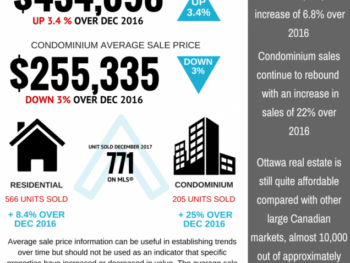
A Strong Finish for Ottawa’s Real Estate Market in 2017
2017 was quite a year in the Ottawa Real Estate market; record breaking numbers in units sold (condominium sales up over 22%) and double digit (percentage) increases in average sale price in several neighbourhoods, Canada 150 (or should we say Ottawa 150?!) was anything but average! Below we’ve included the latest news release from the Ottawa Real Estate Board. Please note: average sale price information can be useful in establishing trends over time but should not be used as an indicator that specific properties have increased or decreased in value. The average sale price is calculated based on the total dollar volume of all properties sold. We have access to current statistics and trends in our neighbourhoods and communities, it’s our job to stay on top of the market trends! We have up to date Real Estate Market Reports readily available for you and we love to chat real estate – contact us anytime! From the Ottawa Real Estate Board: January 4th, 2018 Members of the Ottawa Real Estate Board sold 771 residential properties in December through the Board’s Multiple Listing Service® System, compared with 711 in December 2016, an increase of 8.4 per cent. The five-year average for December sales is 687. December’s sales included 205 in the condominium property class and 566 in the residential property class. The average sale price of a residential-class property sold in December was $434,098, an increase of 3.4 per cent over December 2016. The average sale price for a condominium-class property was $255,335, a decrease of three per cent from December 2016. “December saw an increase of 8.4 per cent in the number of units sold in residential sales and 25 per cent in condo sales. This could very well be attributed to the changes in the mortgage qualification rules implemented January 1, 2018,” speculates Ralph Shaw, 2018 President of the Ottawa Real Estate Board. “2017 was another solid year for the Ottawa Real Estate market in both the number of transactions as well as the reasonable increase in prices, about seven per cent in residential and three per cent in the condo market,” Shaw acknowledges. “We continue to have a stable and balanced market. Although inventory tracked low all year and new listings were down each month, new home supply counteracted the impact somewhat.” The total number of residential and condo units sold through the Board’s MLS® System throughout all of 2017 was 17,083, compared with 15,526 in 2016, an increase of ten per cent. Overall, residential sales volume was up 16 per cent. “In 2017, the condo market rebounded with a 22 per cent increase in the number of units sold, which is quite significant. The relatively flat increase in prices suggests that we found the ideal price point in which to move the units,” Shaw concludes. “As for residential sales, there was a good availability of product under $500,000 considering almost 10,000 out of approximately 13,500 residential units sold fell in that range.” 2017’s average residential sale price was $425,063, an increase of 6.8 per cent over 2016, while the average condominium sale price was $269,903, an increase of 3.4 per cent over 2016. The Board cautions that average sale price information can be useful in establishing trends over time but should not be used as an indicator that specific properties have increased or decreased in value. The average sale price is calculated based on the total dollar volume of all properties sold. Read more…

2017 Recap!
2017 was an amazing year for Real Estate in Ottawa! Records were broken and property values continue to increase. As the year comes to a close, let’s take a look back at some of the highlights with our Top 20 Blog Posts of 2017! #20 – Understanding Multiple Offers This year the Ottawa market became more competitive than ever before and multiple offers have become far more common. Here are some helpful hints to help you navigate multiple offers! #19 – Pets and Real Estate New research emerged this year showing that more and more homeowners are making housing decisions with their furry friends in mind while others are avoiding homes where pets have lived. Let’s look at the impact of pets and how they can affect real estate. #18 – Your Home and Winter Travels It’s at this time of year that many of us choose to get away; whether it’s visiting family for the holidays or heading somewhere sunny and warm, there are certain things you must consider before leaving your home for an extended period of time. #17 – Buying a New Home It seems that everywhere you turn, builders are building new homes around Ottawa. Deciding between a new home or a resale home can be challenging but this article breaks it down for you. And remember, a Realtor can assist you in buying a new-build home to make sure that you have someone on your side! #16 – Why it Doesn’t Always Pay to Sell Your Home Yourself As the market heats up, many people believe that they can take advantage and save some money by listing their home themselves (without a Realtor). In many cases though, this may actually cost you more. Read on to find out more! #15 – Buying a Home that is “For Sale By Owner” Just because the seller has decided to go it alone, does not mean that you must do the same. To ensure that you know what you’re buying and that the whole process goes smoothly, it’s always best to hire a Realtor. #14 – Residential Landlord Rules: An Update There were many changes in the last year affecting both landlords and tenants in Ontario. New protections for tenants were put into place including rent control. Whether you’re a tenant, a landlord, or looking at buying an investment property, it’s important to understand all these changes. #13 – Here’s an Idea of What Goes Into Pricing Your Home There is a lot that goes into pricing a home to ensure maximum return for the sellers in the quickest time. Realtors have many tools at their disposal to ensure that a home is priced competitively in the current market. #12 – Backup Offers: What They Are and How They Work With the competitive market this year came lots of talk about “backup offers”. Find out how they work and how they can be a great option for both buyers and sellers in some situations. #11 – The Role of a Realtor When Selling a Home What exactly does a Realtor do for you when selling your home? A lot more than you may think! Everything from marketing to paperwork, get a little insight into what goes into selling home. #10 – The Role of a Realtor When Buying a Home As a follow up to #11, let’s look at what a Realtor can do for you when buying a home. Having a buyer’s agent on your side is always the best scenario to ensure that your best interests are being considered. #9 – Why You Should Check Out That Open House The internet changed the real estate world and with that more people are house hunting online than ever before! That being said, there are some pretty great advantages to attending open houses so this should not be overlooked! #8 – “Oh I Forgot to Tell You…” What are sellers legally required to disclose about a property? The simple answer is any known latent defects but what about stigmas? Find out how to protect yourself if a stigma would be of concern to you. Stigmas include a house being haunted, the site of a violent crime or death, or the location of a grow op. #7 – The Bank of Mom and Dad With rising house prices and changes to the mortgage rules that can make it more challenging for first time home buyers to get approved, more and more millennials are turning to their parents for help buying a home. #6 – New Year Reno-Resolutions Are you planning any major (or minor) renovations in the coming year? Now is the time to start planning and budgeting! Like any other resolution, keep it realistic to ensure the greatest likelihood of success. #5 – Bang for Your Buck Renos That Will Increase Your Home’s Value After reading #6, you may have some great ideas but you’re not sure of which renos will provide the greatest return on investment. Check out this guide to find out! #4 – Why Listing Price is So Important? A lot of talk surrounds the listing price of a home but why does it matter so much? If a home is priced right, it will bring the seller top value in the shortest amount of time possible. If priced too high or low, both can be negatively affected. #3 – Choosing a Brokerage When Buying or Selling What things should you look for in a brokerage when choosing who to buy or sell your home with? Royal LePage Team Realty offer top level resources and support to our Realtors to ensure client satisfaction. #2 – Primary Residence Tax Exemption This was a major change in 2017 and something to keep in mind when doing your taxes! Although the rules did not change for this tax exemption, everyone will now have to declare the purchase and sale of property even if it is their primary residence. Make note for April if this applies to you! #1

Buying without a Realtor
Buying a house is a big investment, so it is natural to look for ways to save money wherever possible. Some buyers and sellers may assume that they can stretch their budget further if they handle the entire purchase themselves. Doing this may seem like a good way save you money, but can also lead to problems and higher costs in the long run. As a buyer, hiring a Realtor typically does not cost you a cent; your Real estate agent will be paid from the commission on the sale of the home. Hiring a professional who is on your side to ensure that all your bases are covered only makes sense. Can you believe that there was a time when real estate brokerages represented only the seller? It’s true! Buyers had to make one of the most important financial decisions of their lives without a representative truly on their side. Thankfully, today this is no longer the case. Most buyers choose to be represented by a buyer’s agent who, acts as an advocate, and is responsible for protecting your best interests. As a home buyer, your real estate representative can provide you with essential information to help you make an informed decision. As a home buyer, here are a just a few things your real estate representative will do to help you find your dream home: Leverage their familiarity with the neighbourhood and provide you with information about local real estate values, taxes, utility costs, services and amenities. Pinpoint homes that fit your needs and dismiss those that do not, thereby saving you time. Identify the potential problem areas in a home and guide you away from “lemons”. Arrange property showings and accompany you, or preview the properties on your behalf. Previews have become even easier by using the latest technology your realtor can give you a “live” tour even if you are miles away! Research properties to identify any problems or issues to help you make an informed decision prior to making an offer to purchase. Advise you how to structure your offer. This is particularly important in a Seller’s market, which we are currently trending towards in Ottawa real estate. If you end up competing in offers, you’ll be glad you’ve hired a real estate representative, thereby giving you the best chance of your offer being accepted. Present the offer to the Seller’s Agent and the Seller, and negotiate on your behalf. Assist you in securing financing and advise you of your legal options. Recommend appraisal, home inspection and contracting services, as appropriate. When buying a home, you are entering into a legal arrangement, and having no realtor involved at all means that you are only working off of your own experience and knowledge, and that of the seller. In a purchase as large and complex as a home, there are many things that can be missed or glossed over, especially when the people handling the transaction do not have much experience. It can be easy to forget things like arranging a home inspection or a final walk through to ensure a smooth closing. If mistakes are made, it can lead to hefty costs down the road. When you hire a Buyer’s agent, they will fully represent you throughout the real estate transaction. We hope we’ve convinced you to choose a realtor you like and trust for your next real estate transaction!

Winter: Time to keep the heat IN, and your costs DOWN
As winter begins to cover the ground with snow, we Canadians are aware, there’s much more coming our way than just a light dusting. Shoveling snow, spreading salt, and digging out your frozen car, are just some of the “joys” winter may bring to you this season. As the costs of heat and electricity continue to rise, Jack Frost will be nipping at your pocketbook, wanting to extend his winter chills to the interior of your home. If you’re hoping to keep the cold outside, and your heating costs down, the best thing for you to do is to get your home “Winter Ready”. Here are some simply ways to winterize your home: Clean out your gutters Ensure the rain and snow have somewhere to drain to by cleaning your gutters. This will minimize the chance of leaks, and remove excess weight/strain from the gutters. Making sure that the water can freely flow through your gutters now, will stop the formation of icicles and ice-build up later. Reseal your windows Whether you’re purchasing window insulation kits, or redoing the caulk seals, ensuring you minimize the drafts entering the house through your windows will make it easier for the heat to stay in your house. Drafts can sneak in through any improper seal, so be sure to check your need for draft guards, new seals, and even weather-stripping doors as needed. Blocking drafts that may come from improperly sealed doors, windows, and fireplaces can stop up to 70% of your heat and energy from escaping through improper seals – keeping the warm air in, and the cold air out! Store Patio Furniture Extend the life of your patio furniture/BBQ by protecting these items from the elements and storing them indoors this winter. Clean the garage Cleaning up your garage will give you an opportunity for indoor parking. No more scraping ice from the windshields and trying to unbury your car after a snow fall. Parking your vehicle indoors will both keep the vehicle protected, and give you less to do before work in the morning. Fireplace Preparations If you have a fireplace in your house that you plan on using quite frequently this winter, get your chimney/fireplace inspected to ensure that it is safe and clear to use. If your home has a fireplace that you’re not planning on using, block the fireplace with window sealer/insulation kits to help minimize the escaping heat. For more tips on winterizing your fireplace, check here to see what’s important when checking your fireplace before the season. Hoses/Outdoor Water To avoid a messy springtime of sorting through hoses for ones that haven’t cracked, drain the water from your outdoor hoses, and store them indoors for the winter. Turn off any outdoor water taps to avoid freezing Insulate Pipes Pipe insulation kits can be used to keep the water pipes in your home from freezing. Find out everything you need to know about winterizing pipes here. Furnace Preparations If your home’s main heat source is a furnace, get your furnace ready for winter by making sure that it is running effectively prior to the cold nights ahead. Check your filters on a monthly basis to ensure your home is getting clean, and proper airflow Should your furnace need to be repaired, or replaced – consider applying to make your home more energy efficient using Federal/Provincial Tax Credits to lower the expense of replacing/repairing your furnace. Click here for more information on Energy Savings Plans. Automate your Thermostat Set your thermostat to automatically adjust its’ temperature setting, which can be set to be cooler during the daytime and warmer at night. Setting a temperature will ensure you have consistent/reliable heat, but no one is cranking the thermostat to 85 and having a tropical vacation temperature in your living room Shovels, Salt, and Snow-blowers Don’t wait until the day after a big storm hits to pull out your snow-blower, and shovels. Take a look at them ahead of time – are any of them in need of repairs? Do you have gas in the snow-blower? Salt ready for icy mornings? If not – time to get prepared before the ice hits. Far better to have salt on hand, rather than being reminded that you need it by falling in the morning! A home is a place of warmth and comfort, so keep those chilly winter drafts out this year by winterizing your home. The only thing better than being warm on a cold winter’s night, is your heat is staying inside with you. Don’t get caught up in drafts, get your winterizing done soon, so those -30 evenings feel like summertime.

Christmas in the Capital
December has arrived! And with it, for many, comes the anticipation of holiday activities, traditions and celebrating with family and friends. We’ve been lucky to have had some truly incredible events in the Ottawa area this year, but it’s not over yet! As Canada 150 comes to a close, there are a multitude of Christmas events that are taking place all over our City, allowing us to commemorate the end of one year, and the start of something new with our family and our friends. Here’s a taste of what’s happening in Ottawa this holiday season: Alight at Night at Upper Canada Village: travel back in time to the days where wagons were drawn by horses, and buildings were built by hand to view the magic that is the over half a million lights lit up throughout the village’s streets, trees, shops and homes. From December 1st to January 6th between the hours of 5pm and 9pm, Upper Canada Village will offer scenic horse drawn wagon rides, a life size gingerbread house, a toy train ride for the kids and so much more. Originals Ottawa Christmas Craft Sale: Ottawa’s very own 10-day holiday shopping event! Between December 7th and 17th, the EY Centre will gather some of Canada’s most talented artists, artisans and designers for you to meet and purchase from – over 200 to be exact! A great opportunity to support our local community as well as cross a few items off your shopping list! For more information on hours, admission and handmade goods, follow this link to their website. Stanley’s Christmas Village: get whisked away by horse drawn carriage to Ottawa’s only Elf Village! Every Saturday and Sunday through December (until the 23rd), Stanley’s Olde Maple Lane Farm offers you and your family the ultimate Christmas experience – as seen through the eyes of an elf. Enjoy a hot cup of cocoa, and take a ride through the Wrapping Warehouse, The Reindeer Stables, Ginger’s Bakery and so much more. And hey, why not end your day selecting your very own Christmas tree? Freshly cut, locally grown trees are now available at the Farm – all additional details can be found here! Viewing the Christmas Lights: With our nation celebrating its 150th milestone this year, the City of Ottawa (and across the bridge into Gatineau) have set up thousands of lights for your viewing pleasures. Catch the glow between December 7th and January 7th of 2018. And it doesn’t end there! if you’d like to experience even more spectacular “drive-through” light displays this holiday season, load up the car, blast the Christmas tunes and venture to the Magic of Lights in Ottawa’s west end at Wesley Clover Parks or even the beloved Taffy Lane in Orleans. Needless to say, the number of Christmas activities that our City has planned for us this holiday season are endless – and absolutely amazing. From rides in sleighs to light displays, there is something for everyone and more. Have a safe and memorable holiday!
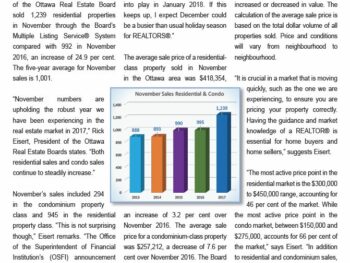
Ottawa Real Estate Latest Market Snapshot
It’s hard to believe November is over but here we are! If you’ve been following Ottawa real estate you’ll know it’s been a busy 2017 and December will likely be no exception. With the new mortgage rules coming into play in a few short weeks, many buyers are motivated to have firm deals completed before January 1st, 2017. We’ve included the latest news release from the Ottawa Real Estate Board below. Please note: average sale price information can be useful in establishing trends over time but should not be used as an indicator that specific properties have increased or decreased in value. The average sale price is calculated based on the total dollar volume of all properties sold. We have access to current statistics and trends in our neighbourhoods and communities, it’s our job to stay on top of the market trends! We have up to date Real Estate Market Reports readily available for you and we love to chat real estate – contact us anytime! Ottawa Real Estate Update | Latest News and Highlights in the Ottawa and Area Real Estate Market OTTAWA, Dec. 5, 2017 – Members of the Ottawa Real Estate Board sold 1,239 residential properties in November through the Board’s Multiple Listing Service® System compared with 992 in November 2016, an increase of 24.9 per cent. The five-year average for November sales is 1,001. “November numbers are upholding the robust year we have been experiencing in the real estate market in 2017,” Rick Eisert, President of the Ottawa Real Estate Boards states. “Both residential sales and condo sales continue to steadily increase.” November’s sales included 294 in the condominium property class and 945 in the residential property class. “This is not surprising though,” Eisert remarks. “The Office of the Superintendent of Financial Institution’s (OSFI) announcement regarding the new stress tests for low- ratio borrowers may have buyers rushing into the market before the stricter mortgage regulations come into play in January 2018. If this keeps up, I expect December could be a busier than usual holiday season for REALTORS®.” The average sale price of a residential class property sold in November in the Ottawa area was $418,354, an increase of 3.2 per cent over November 2016. The average sale price for a condominium-class property was $257,212, a decrease of 7.6 per cent over November 2016. The Board cautions that the average sale price can be useful in establishing trends over time but should not be used as an indicator that specific properties have increased or decreased in value. The calculation of the average sale price is based on the total dollar volume of all properties sold. Price and conditions will vary from neighbourhood to neighbourhood. “It is crucial in a market that is moving quickly, such as the one we are experiencing, to ensure you are pricing your property correctly. Having the guidance and market knowledge of a REALTOR® is essential for home buyers and home sellers,” suggests Eisert. “The most active price point in the residential market is the $300,000 to $450,000 range, accounting for 46 per cent of the market. While the most active price point in the condo market, between $150,000 and $275,000, accounts for 66 per cent of the market,” says Eisert. “In addition to residential and Condominium sales, OREB Members assisted clients with renting 2,821 properties since the beginning of the year.”
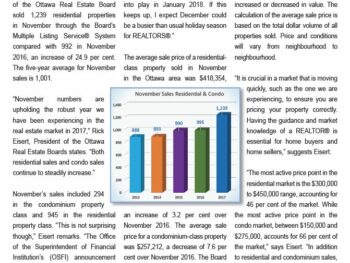
Ottawa Real Estate Latest Market Snapshot
It’s hard to believe November is over but here we are! If you’ve been following Ottawa real estate you’ll know it’s been a busy 2017 and December will likely be no exception. With the new mortgage rules coming into play in a few short weeks, many buyers are motivated to have firm deals completed before January 1st, 2017. We’ve included the latest news release from the Ottawa Real Estate Board below. Please note: average sale price information can be useful in establishing trends over time but should not be used as an indicator that specific properties have increased or decreased in value. The average sale price is calculated based on the total dollar volume of all properties sold. We have access to current statistics and trends in our neighbourhoods and communities, it’s our job to stay on top of the market trends! We have up to date Real Estate Market Reports readily available for you and we love to chat real estate – contact us anytime! Ottawa Real Estate Update | Latest News and Highlights in the Ottawa and Area Real Estate Market OTTAWA, Dec. 5, 2017 – Members of the Ottawa Real Estate Board sold 1,239 residential properties in November through the Board’s Multiple Listing Service® System compared with 992 in November 2016, an increase of 24.9 per cent. The five-year average for November sales is 1,001. “November numbers are upholding the robust year we have been experiencing in the real estate market in 2017,” Rick Eisert, President of the Ottawa Real Estate Boards states. “Both residential sales and condo sales continue to steadily increase.” November’s sales included 294 in the condominium property class and 945 in the residential property class. “This is not surprising though,” Eisert remarks. “The Office of the Superintendent of Financial Institution’s (OSFI) announcement regarding the new stress tests for low- ratio borrowers may have buyers rushing into the market before the stricter mortgage regulations come into play in January 2018. If this keeps up, I expect December could be a busier than usual holiday season for REALTORS®.” The average sale price of a residential class property sold in November in the Ottawa area was $418,354, an increase of 3.2 per cent over November 2016. The average sale price for a condominium-class property was $257,212, a decrease of 7.6 per cent over November 2016. The Board cautions that the average sale price can be useful in establishing trends over time but should not be used as an indicator that specific properties have increased or decreased in value. The calculation of the average sale price is based on the total dollar volume of all properties sold. Price and conditions will vary from neighbourhood to neighbourhood. “It is crucial in a market that is moving quickly, such as the one we are experiencing, to ensure you are pricing your property correctly. Having the guidance and market knowledge of a REALTOR® is essential for home buyers and home sellers,” suggests Eisert. “The most active price point in the residential market is the $300,000 to $450,000 range, accounting for 46 per cent of the market. While the most active price point in the condo market, between $150,000 and $275,000, accounts for 66 per cent of the market,” says Eisert. “In addition to residential and Condominium sales, OREB Members assisted clients with renting 2,821 properties since the beginning of the year.”

What Canadian home buyers need to know NOW about the upcoming changes to Mortgage rules
What home buyers need to know before 2018 As of January 1, 2018, Canadian homebuyers will have to meet stiffer requirements in order to qualify for a mortgage with a federally regulated mortgage lender. Why are the Mortgage Rules changing? As Canada’s financial “watchdog” OSFI believes these new rules will decrease the risks for Canadian households with significant debt if and when the interest rates rise. Are you a Confused by the upcoming changes to the mortgage rules? Don’t panic. Our very own Kent Browne, Owner and Broker at Royal LePage Team Realty, sat down with Mortgage Broker York Polk of Mortgage Alliance to discuss all these changes in order to help you, our clients, understand how they may affect you. Here are the highlights: Changes that came into effect November 30, 2016 and still apply: All buyers having a down payment of less than 20% are required to pass a “Stress Test”* to obtain a mortgage. To pass the stress test, buyers with a payment of less than 20% need to qualify at a higher rate (4.64% at the time) even though the contract rate is much lower (2.3% at the time). Changes starting January 1, 2018 When OSFI’s new rules take effect – even those who have down payments of 20% or higher and do not require mortgage insurance – will also have to undergo a “Stress Test”. Home buyers will need to qualify for mortgages that are two percentage points higher than the rates at which they are applying. The qualifying rate for the “Stress Test” would be the greater of either 2% higher than the contract rate or the Bank of Canada rate (currently at 4.99%). The contract rate remains unaffected. If you’re a prospective home buyer concerned about how the new mortgage rules will impact your buying power, here are a few tips: If you are thinking about buying a home, seriously consider buying now. Any firm agreement of purchase and sale on a specific property that has been completed and signed off on will follow the old rules, regardless of the closing date. Note, if you need to make any changes to the agreement after January 1st, you will need to qualify within the new rules. Conventional mortgages can be stretched over up to 30 years and by doing so, it will be easier to qualify at this time. While home buyers should always get pre-approved, this will not protect you from needing to qualify under the new rules if you are unable to purchase a property before 2018. Contact your Realtor and a professional mortgage broker now to ensure that there are no surprises when it comes time to buy a home. Questions? We’d love to help! Contact us info@teamrealty.ca. * Stress testing is a best practice risk management tool. Stress tests are not predictions or forecasts, they involve searching out extreme “what if” scenarios that have a very remote chance of happening, and planning for them. Diligent stress testing is an essential part of CMHC’s risk management program and allows CMHC to evaluate its capital levels against multiple scenarios. Effectively, they confirm if CMHC’s capital holdings are sufficient for even the most extreme scenarios. Stress tests are used by financial institutions to gauge how their business would fare under extremely difficult conditions. They provide a formalized mechanism for companies to look at risks and to assess the impact of the different extreme events. This information is from the CMCH article found here.

Why it doesn’t always PAY to sell your home yourself
With today’s hot real estate market, it may be tempting to consider listing your home yourself, without the assistance of a real estate professional; it is often seen as a way to increase profits since no commission will need to be paid out but in reality, this is not often the case. If you choose to sell your home “For Sale By Owner”(FSBO), there are many factors to consider including additional costs and stress, so it is always advisable to list with a Realtor who knows what they are doing; you may actually make more money by doing so! Here are just a few of the reasons why you should hire a Realtor: You may not get top dollar How do you price a home without access to ALL the information – There is a lot that goes into pricing a home including comparing your home to others that have sold in your neighbourhood. Only Realtors have access to that information so you could be left guessing. Homes that are FSBO tend to sell for less than those listed with a Realtor – Buyers often expect to pay less for a FSBO home for a variety of reasons: buyers expect a bit of a deal since the seller is not paying commission to a Realtor and Buyers must pay more out of pocket in legal fees to get the paperwork signed. Along with pricing issues, this can lead to a lower sale price. Marketing can be challenging Realtors have access to many marketing tools that you do not – It takes a lot more than putting a sign on the front lawn to market a house. You may think that promotion through social media will ensure your FSBO sells quickly but this is often not the case; unless you luck out and find that one of your contacts is interested in your home (which is statistically unlikely), what happens next? Realtors have a much wider social media reach and followers who are looking to buy a home! Realtors also have websites and spend time and money to drive traffic towards them. Your listing is far more likely to be seen if you list with a Realtor. Getting your listing on the MLS System – The MLS is where all Realtors and many potential buyers search for listings. It is how your listing will get seen. If you list your property with a Realtor, it will be listed through MLS. There are FSBO Service Providers out there who can get your listing on the MLS, but do your research! Make sure that your listing will appear on the right real estate board’s site and take into consideration the upfront cost of these services. Do you have time? People won’t buy your home unless they can see it – Are you available to host showing of your home at any time of day; if you choose to sell your home yourself, it will be up to you to host the showings. Can you take time off work for daytime showings? Are you available on weekends? If you list with a Realtor, they will take of that for you. Marketing takes time – All those things mentioned above take time; do you have enough time to work on all the marketing and organizational tasks that go along with selling a home? Longer time on market – homes that are listed FSBO tend to sell less quickly than those which are listed with a Realtor. Do you have that extra time? There are many added costs to keep in mind Professional photos – Getting your photos done with an experienced photographer is incredibly important as you want your home to stand out online (where most people do a large chunk of their home search). A Realtor will cover these costs for you but if you go it alone, you will have to cover this yourself. Advertising – To ensure the home is seen by as many potential buyers as possible, you will likely have to pay for advertising and this can add up quickly. Legal Fees – If you list your home yourself, you will not have a Realtor to do the paperwork with you and you will need to rely on your lawyer a little more than you would otherwise. Lawyers are not cheap so this can be costly. MLS Listing – If you choose to get your home on the MLS, this will cost your upfront as well to do with a FSBO service provider. ***Remember, if you list your home with a Realtor, you will not need to pay them a penny until it closes!

Residential Landlord Rules: An Update
Over the past year, there have been many significant changes to the rules for Residential Landlords. These changes may seem overwhelming, but we are here to help; if you have any further questions, do not hesitate to contact a Realtor. Outlined below are the major rule changes as well as an understanding of how they may affect you as either a landlord or a tenant. September 2016 – Terminations for Domestic Abuse New rules have been put in place involving the termination of a lease in the case of domestic abuse. The landlord no longer has the ability to challenge or investigate these allegations and the notice terminates the tenancy, regardless of whether it is based on a true incident. The residential landlord is also obligated to respect his/her confidentiality obligations. What this means for tenants: Tenants who have been the victim of domestic abuse will be able to terminate a lease without penalty or the challenges of having to prove their case. Confidentiality protection to ensure that victims remain safe. For victims of domestic abuse, this could make it easier for them to leave potentially threatening situations. What this means for landlords: If a tenant claims domestic abuse as the reason for termination of the tenancy, the landlord is obligated to respect this claim and terminate the tenancy. Tenants could claim abuse as a reason to terminate a tenancy quickly and without penalty, even if it is not true. May 2017: Elimination of Post-1991 Exemption for Rent Control According to the Residential Tenancies Act, expansions have been made to include most private rental units in Ontario in Rent Control Guidelines. Ontario landlords can no longer increase rent by more than the amount set by the Government of Ontario’s Rent Increase Guideline. Prior to these expansions, tenants who resided in homes (including apartments, condo units and houses) that were either built or rented out on or after November 1st of 1991, were exempt from rent control protections. What this means for tenants: Assurance that their rent, in any rental unit, will not increase by more than the Government’s yearly guideline (usually between 1.5% and 2%). Eliminates the horror stories of landlords doubling rents (or sometimes more) that we have heard on the news. What this means for landlords: Less choice when it comes to rent increases. Long-term tenants may mean the landlord makes less money. September 2017: New Rules regarding Family and Personal Use Prior to its current, revised rule, landlords could terminate a tenancy for personal and/or family use. Upon review, if a landlord chooses to terminate tenancy for family or personal use, they must meet the following guidelines: The property must used on a personal level for a minimum of 12 months; They must compensate the tenant with one month’s rent; The property must be personally owned, not by a corporation. What this mean for tenants: Limits unforeseen situations requiring tenants to move. Makes it less likely that a landlord will terminate tenancy with this excuse unless it is actually the case. What this means for landlords: Stricter guidelines and higher compensation for tenants. More challenging in a situation where you or a family member may need to move into that unit. Problems with tenants will need to be dealt with directly as this is no longer an option to terminate tenancy. Coming soon: Standard Lease The development of a Standard Lease. To be respected and followed by all landlords, the creation of this new lease will allow of additional, legal clauses to be written in the agreement between the landlord and his/her tenant. This new document will provide consistency across the province and aims to protect both landlords and tenants.

Bang For Your Buck: Renos That Will Increase Your Home’s Value
If you are a homeowner, you’ve probably spent money on your property over and above the regular carrying costs. Investing in your property has the obvious benefits of making your home nicer to live in, but smart renovations can also have the side benefit of increasing a home’s value when it comes time to sell. Below is a list of some of the home renovations that have been shown to add the most to a home’s value, as well as some renovations to avoid. Flooring Flooring can be a costly renovation, but can also add to a home’s value if it is done properly. Generally speaking, wall-to-wall carpeting is not as desirable as it once was, and some potential buyers may even see it as a nuisance that they will have to replace. Hardwood floors, and tiled floors for bathrooms, on the other hand are in higher demand and are likely to increase your home’s value. A particularly easy way to do this is to refinish existing hardwood floors, getting the benefit at a much lower cost than installing new ones. Fixtures Fixtures are a bit more complicated when it comes to improving the value of your home. Generally speaking, installing new fixtures will improve your home’s value up to a certain point. It is worth adding in new fixtures or updating old ones that improve the function and look of a room, especially the bathroom and kitchen, like new faucets and light fixtures. However, spending extra money on high-end fixtures and appliances will likely end up costing you more money in the long run, since they may not match a potential buyer’s plans. High-end upgrades don’t generally increase a home’s value if they are inconsistent with the rest of the home, and specific high-end features like media rooms or swimming pools rarely make back their cost. Kitchens and Bathrooms The kitchen and bathrooms are some of the most important rooms in a house in terms of value, and are worth paying attention to when it comes time to renovate. Renovations to these rooms often add to the home’s value, as long as they are functional and not purely decorative improvements, and adding a bathroom to a home can increase the value substantially. When aiming to improve a home’s value, the kitchen and bathrooms should be one of the first places to look. Updating fixtures, replacing older plumbing and making everything look clean and functional are good steps to a more valuable home. Income Suites & Coach Houses The single greatest improvement you can make to your home’s value will be through the addition of an income suite or a coach house. By converting a basement into a rental unit or adding a coach house, you can bring in supplemental income while you are still living in your house. An income suite is also a valuable thing when it comes time to sell, since it is a wise investment for potential homebuyers as well. Of course it’s vital that an income suite meets all code requirements, and that any permits or other necessary paperwork is properly completed. Otherwise it could go from being a big improvement to a big problem! Renovating for Profit? Speak to a Professional When renovating for profit, it is always a good idea to speak with a professional in the Ottawa real estate market, since they will know what homebuyers are looking for and will guide you on the value of your home before and after a potential renovation. It also helps to remember that increasing the value of a home is a wise move, but it is also good to pay attention to what you want your home to look like while you are living in it. The post Bang For Your Buck: Renos That Will Increase Your Home’s Value appeared first on Team Realty. Source: Blog
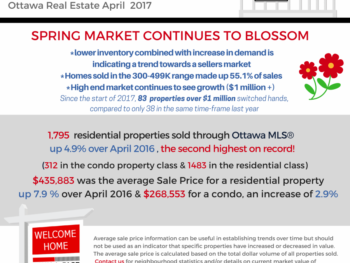
Latest Real Estate Market Snapshot: April 2017
Curious about what’s going on in the Ottawa Real Estate Market? Below are some highlights of our April 2017 market. Curious about a certain area? Please contact us and/or one of our Sales Representatives for details, we have up to date statistics on all Ottawa neighbourhoods and the surrounding areas. Spring Market Continues to Blossom! News release from the Ottawa Real Estate Board, May 3rd, 2017 OTTAWA, May 3, 2017 – Members of the Ottawa Real Estate Board sold 1,795 residential properties in April through the Board’s Multiple Listing Service® System, compared with 1,711 in April 2016, an increase of 4.9 per cent. The five-year average for April sales is 1,613. “The April resale market continued its upward trend in units sold, just shy of a record set in 2010,” says Rick Eisert, President of the Ottawa Real Estate Board. “Sales activity is indicating a trend towards a seller’s market. Lower inventory, combined with increased demand, is creating many more multiple offer situations and quicker moving properties, with the average cumulative days on market dipping to just 71 days.” April’s sales included 312 in the condominium property class, and 1,483 in the residential property class. The condominium property class includes any property, regardless of style (i.e. detached, semi-detached, apartment, townhouse, etc.), which is registered as a condominium, as well as properties which are co-operatives, life leases, and timeshares. The residential property class includes all other residential properties. “We continue to see a trend in the amount of high-end units selling,” reports Eisert. “Properties selling for $500,000 and up has increased over last year, and even more significantly in the over $1 million market, which doubled in sales over April 2016. Since the beginning of the year 83 properties over $1 million switched hands, compared to only 38 in the same time-frame last year. The increase in sales for high-end properties may be fuelled by a combination of the migration of buyers from Toronto and move-up buyers. Another contributing factor is that many, generally well paying, jobs are opening up in the high-tech sector, driving more people into the Ottawa market.” The average sale price of a residential-class property sold in April in the Ottawa area was $435,883, an increase of 7.9 per cent over April 2016. The average sale price for a condominium-class property was $268,553, an increase of 2.9 per cent over April 2016. The Board cautions that the average sale price can be useful in establishing trends over time but should not be used as an indicator that specific properties have increased or decreased in value. The calculation of the average sale price is based on the total dollar volume of all properties sold. Price and conditions will vary from neighbourhood to neighbourhood. “The two most active price points in the residential market continue to be the $300,000 to $399,999 followed by the $400,000 to $499,999 range, combined accounting for 55.1 per cent of the market. Within the condo market, the most active price point was between $150,000 and $249,999, accounting for 53.8 per cent of the market,” says Eisert. “In addition to residential and condominium sales, OREB Members assisted clients with renting 865 properties since the beginning of the year.” The post Latest Real Estate Market Snapshot: April 2017 appeared first on Team Realty. Source: Blog

Spring Gardening 101
May is here, and with all the April showers we’ve seen this year we are sure to see a lot of flowers appearing soon. Beautiful gardens and thoughtful landscaping can enhance your property’s curb appeal and make spending time outside more enjoyable, but not everyone has a green thumb! We’ve collected some helpful tips for those who might need a little help. Planning Your Garden You can start planning your garden at any time, but it is best to have some ideas in mind before you start digging or planting. Here are some things to keep in mind when planning your garden: Decide what kind of plants you want to grow; Flowers? Herbs? Vegetables? A mix? You should also consider whether you want to grow annuals, perennials, or a mix of both. Decide where you want your garden to go, how big you want it to be, and how many plants you want to have in it. As part of the planning process you should check your soil’s drainage and quality if you can, so you will know if you need to make any adjustments. Make sure your garden will get about six full hours of sun per day, the optimum for plant growth. Decide what varieties of plants you want to grow, and find out the growing conditions each needs. Some plants can be planted earlier or later in the year, or need a certain amount of shade. You should take all these things into account when planning your garden. Planting Your Garden Once you have a plan in mind it’s time to get planting. Here are some helpful tips for the down-in-the-dirtiest part of gardening: If you want to plant your garden where you currently have grass, but don’t want to dig up the sod, you can put down five or so layers of newspaper over the section you want to plant. This will kill the grass in the area and start converting it into fertilizer. This will take a few months to work though, so you will need to plan ahead. Before you plant anything, add fertilizer to the soil. This can include composted dirt or solid fertilized, but make sure to mix it into the soil well. You will also want to break up the soil a bit for the plant’s roots, but not too much. If you are in a rush you can start sprouting seeds in your home, or buy plants that have already been sprouted. This way your plants will already be growing when you put them in the ground. No matter whether you are planting seeds or seedlings, make sure you read the instructions on how far enough the plants need to be and how deep to plant them. Make sure to water plants right after planting them, and regularly afterwards. Plants need more water when they are first growing than at any other time, but make sure not to drown them. Maintaining Your Garden Once the planting is done you may be tempted to sit back and relax, but there is still a lot you can do once your plants have grown in order to keep your garden healthy. Here are some tips to keep your plants healthy: Be sure to water regularly, preferably early in the morning to avoid evaporation. Try to water the soil and not the leaves, as wet leaves can lead to fungus infestations. Patrol your garden regularly for weeds and pests, and make sure to get rid of any you see as quickly as possible. The longer a weed grows or a pest gnaws, the harder they will be to get rid of and the more damage they will do. Keep your plants trim. Removing dead flowers, regularly picking fruits and vegetables, and removing blossoms before they seed (unless you want to keep the seeds) will help your plants conserve energy and encourage more growth. There is a lot more to learn about gardening, but these tips should help you on your way. The post Spring Gardening 101 appeared first on Team Realty. Source: Blog

Canada 150: Let’s Celebrate!
Canada Day is coming up, and there is no shortage of celebrations to enjoy on July 1st this year. With Canada turning 150, there’s no better time to join in the festivities. If you are looking for something fun to do this Canada Day with friends and family, here are some suggestions. Downtown Events The Canada Day events hosted in downtown Ottawa are always the biggest and most impressive, and this year looks to be no exception: Parliament Hill – Parliament Hill will be holding Canada Day events from morning till night, including ceremonies, shows, activities for young and old, all culminating in a spectacular fireworks show over the Ottawa River. You won’t want to miss it! Major’s Hill Park – Major’s Hill Park will be filled with day events this July 1st, including a wide variety of multi-cultural exhibits, displays and performances. There will be plenty of activities for people who want to get involved, or just watch on the sidelines, so pick your activity and have some fun! Canadian Museum of History – The Canadian Museum of History will be hosting a number of events throughout the day, with plenty of inside and outside games, performances, exhibits and other activities aimed for kids and families. There’s even a free shuttle from Major’s Hill Park, and the museum is right on the Ottawa River, so you can watch the fireworks from there if you find Parliament Hill too crowded. Municipal Events For people who can’t get downtown, or don’t want to face the crowds, there is plenty of Canada Day fun to be had throughout the city. We’ve included a list of a few below, but you can also find the official list of all the civic events here: Canada Day in Barrhaven – This large event in Ottawa’s South attracts big crowd every year, and includes a carnival with rides and games, the Homeniuk Midway, plenty of food vendors, fun and games for kids and adults, and of course a fireworks show. Canada Day in Kanata – This event has plenty to do for people of all ages, from the Carter Shows Midway to the Kanata Festival of Beer, and also features a marketplaces for local small businesses, a breakfast for seniors, baseball games, demonstrations of martial arts and dancing, and plenty more. A fireworks display will close the day off with a bang. Canada Day in Stittsville – Stittsville may be smaller than Kanata or Barrhaven, but that doesn’t mean it lacks excitement. Stittsville’s Canada Day celebration will include a petting zoo and horse-drawn wagon rides for animal lovers, a sports demonstration, family games and activities, a magic show, plenty of food vendors for when people get hungry, the Royal Canadian Legion Colour Party, and live stage entertainment. No Canada Day celebration would be complete without a fireworks display, and Stittsville will certainly deliver. No matter where you decide to celebrate it, make sure to have fun on July 1st this year, and make the 150th Canada Day one to remember! The post Canada 150: Let’s Celebrate! appeared first on Team Realty. Source: Blog

Why Listing Price is So Important
Why Listing Price is So Important What is your home worth? This is a tricky question and there are many factors to consider including condition, upgrades, market trends and comparable properties in your neighbourhood. The listing price of a home can make or break a sale so it is always advisable to work with a real estate professional who will do the research and advise you on the best listing price for your home. This will ensure not only that it sells quickly but also for the best possible price in the shortest time. Why is the original listing price so important? “First impressions are everything when selling your home. Studies have shown that the first two weeks on the market are the most crucial to your success.” It is important to put your best foot forward! Although it may be tempting to price your home high, to see what happens, especially if you are not in a rush to sell, this may not work out the way that you hope it will. Homes that are overpriced and then drop the price several times, tend to sell at a much lower price than what the original asking price should have been. A new listing gets way more views online in the first few weeks than at any other time so make sure that your price is right from the very beginning. What is a Comparative Market Analysis? Your Realtor will provide you with a Comparative Market Analysis (CMA) for your home. This document will compare recently sold homes similar to yours in your neighbourhood as well as homes that are currently on the market. The CMA will paint an accurate picture of the current real estate market in your area and what you could expect to make for your home. The key here is that Realtors have access to information that is not available to the general public; for example, there is no way to find out the selling price of homes in your neighbourhood otherwise. All homes are different and this is also considered. Your home will be compared against the others with a variety of factors to show how it compares and to help determine the ideal asking price. Ultimately, It is YOUR Decision… At the end of the day, it is your home and you can price it however you may choose but it is always advisable to trust your Realtor. They are professionals who understand the market and have access to information to come up with the best price for listing your home. “Choose the right professional to help you with your home sale and then listen to your real estate agent’s advice and your transaction is more likely to go through quickly and smoothly from the beginning.” And also remember, your home is only worth what someone is willing to pay on the day they choose to buy it but pricing your home competitively can help lead them to that decision. The post Why Listing Price is So Important appeared first on Team Realty. Source: Blog
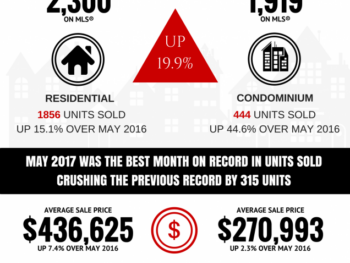
Ottawa Real Estate Snapshot May 2017
Another record breaking month in the Ottawa Real Estate market with the highest number of properties sold in one month ever recorded! The Ottawa condo market is gaining significant strength, with 44 Condos sold last month, that’s 44.6% more than May 2016. We are still seeing lower than normal inventory, more multiple offer situations and fewer days on the market which is good for sellers but with prices remaining “relatively steady”, it is also good news for Buyers. Check out the highlights below and send us an email to info@teamrealty.ca for details and info on specific properties, we love to chat about real estate! Below is the latest news release from the Ottawa Real Estate Board Condo sales lead the way for stellar performance in May 2017 OTTAWA, June 2, 2017 – Members of the Ottawa Real Estate Board sold 2,300 residential properties in May through the Board’s Multiple Listing Service® System, compared with 1,919 in May 2016, an increase of 19.9 per cent. The five-year average for May sales is 1,946. “Not only was May 2017 the best May on record for unit sales, it also surpassed the record for highest unit sales in a single month ever; blowing the previous record out of the water by 315 units,” says Rick Eisert, President of the Ottawa Real Estate Board. “One of the reasons for these stellar numbers can be attributed to the condo market, which has really helped strengthen the whole market over the past several months. This is quite evident in May, where units sold increased by 44.6 per cent over May 2016.” May’s sales included 444 in the condominium property class, and 1,856 in the residential property class. The condominium property class includes any property, regardless of style (i.e. detached, semi-detached, apartment, townhouse, etc.), which is registered as a condominium, as well as properties which are co-operatives, life leases, and timeshares. The residential property class includes all other residential properties. “Sales activity continued to trend towards a sellers’ market, as evidenced by lower than normal inventory levels and listing averages for May, more multiple offer situations, and fewer days on market, but prices still remain relatively steady,” explains Eisert. “If we were in a true sellers’ market, we would expect to see a much higher spike in prices.” The average sale price of a residential-class property sold in May in the Ottawa area was $436,625, an increase of 7.4 per cent over May 2016. The average sale price for a condominium-class property was $270,993, an increase of 2.3 per cent over May 2016. The Board cautions that the average sale price can be useful in establishing trends over time but should not be used as an indicator that specific properties have increased or decreased in value. The calculation of the average sale price is based on the total dollar volume of all properties sold. Price and conditions will vary from neighbourhood to neighbourhood. “Higher-end residential units in the $750,000+ range continue to outperform sales from last year, especially in the $1 million+ range, where unit sales have almost doubled those in May 2016,” says Eisert. “We are not seeing quite the same trend for condo units though, where there are increases in units sold in almost all price ranges.” “The two most active price points in the resid ential market continue to be the $300,000 to $399,999 followed by the $400,000 to $499,999 range, combined accounting for 56.4 per cent of the market. Within the condo market, the most active price point was between $150,000 and $249,999, accounting for 50.7 per cent of the market,” says Eisert. “In addition to residential and condominium sales, OREB Members assisted clients with renting 1,551 properties since the beginning of the year.” “Market Minute” with Kent Browne – Brokerage Owner of Royal LePage Team Realty The post Ottawa Real Estate Snapshot May 2017 appeared first on Team Realty. Source: Blog
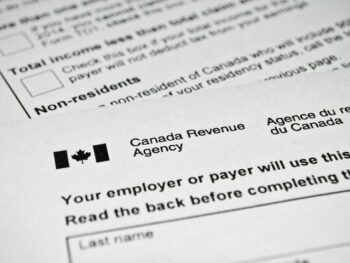
Primary Residence Tax Exemption
The federal government has recently made some changes to the Canadian tax system regarding the capital gains from selling residences. Some people are quite worried about what these changes, which you can find directly from the CRA, may come to mean when they sell their homes, but you shouldn’t panic. These changes will not greatly affect most homeowners, who only own a single home they live in. What will stay the same: The capital gains tax exemption from selling a principal residence will not change. This means that any profit you make on selling your home, as long as it is your primary residence, will be sheltered from tax. People who were concerned that selling their house after the new regulations come in would cost them a lot of money can be reassured, that part of the code has not changed. What will change: The main thing that has changed is that Canadians will need to report all property sales, along with a few other details such as dates of acquisition and sale, the profits from the sale, and a description of the property on their tax return. Before, Canadians did not need to provide this information when they sold their primary home. Forms to fill in this information will be added to Canadian tax forms once the changes take effect. People who own multiple properties will need to designate one as their primary residence, which they will need to actually occupy, and the rest will not be subject to capital gains protection. The change to the tax code will also affect people who only live in a residence for a short period of time, such as home flippers or “serial home builders” and people who live in one part of their residence but rent out other parts. In these cases the property may be classified as a profit making residence and thus will not be eligible for the residential tax exemption. What this all means: The main change to most people will simply be that they have to report any property sale, even if it is the only home they own. For people who own more than one property, they will need to designate one residence as their primary residence, and will have to maintain residence there for at least some portion of the year. CRA will also have the authority to audit properties that people have designated as a primary residence when CRA does not think people actually resided there. This means that people who own multiple properties and want to get the most tax savings should consult with a professional to determine which property they should live in. Overall, these tax changes will hardly affect the average Canadian. However, home flippers, landlords, and other people who make money off of having multiple properties will likely find their profits reduced, as CRA removes the capital gains tax shelter from a higher number of properties than before. The post Primary Residence Tax Exemption appeared first on Team Realty. Source: Blog

Buying a Home that is “For Sale By Owner”
A home is likely the biggest purchase of your life so what happens if you find the perfect property but it is “For Sale By Owner” (FSBO)? To avoid surprises, headaches, and extra costs, it is always advisable to work with Buyer’s Agent; just because the seller has opted to go it alone does not mean that you have to! A Buyer’s Agent will represent your best interests through the process and will ensure that you know what you are buying without any surprises. Here are some important things to consider before making an offer on a FSBO home. Who Pays the Commission? When you buy a home that is listed by a Realtor, as the buyer you do not pay your Buyer’s Agent’s commission (this is covered by the seller) but this may not be the case when buying a FSBO property. Often enough, FSBO sellers will agree to pay your Realtor’s commission but if they don’t, this will be up to you. The good news is that this will be agreed upon before you make an offer so there are no surprises. Also keep in mind that if you choose to buy the home without a Realtor, this will add extra work for you real estate lawyer (verifying contracts, offers etc.) and this may make your legal bill significantly higher. If you choose to work with a Buyer’s Agent and do have to pay the commission, at least that price is set. Disclosure You need to keep in mind that a FSBO seller is not bound by the same rules as a Realtor. They do not need to notify you of other offers, they may disclose the details of other client’s offers to other interested parties, and most importantly, they may not disclose all known facts about the home. These can all pose major challenges through the buying process but a Realtor can help you navigate these challenges and spot “red flags”. You don’t want to be surprised after moving in and a Buyer’s Agent can help you ensure that you make the right inquiries about the property. Negotiating You want someone on your side that knows the art of negotiation! There is a good chance that you have never negotiated the purchase or sale of a home yourself in the past while a Realtor does it all the time. Your Buyer’s Agent will be able to advise you on the process and ensure that all the proper forms are completed through the offer process. Should you consider a FSBO? It is certainly easier to purchase a home which is listed with a Realtor but if the home that you have been looking for is a FSBO, it should not be overlooked simply for this reason; just find a Realtor to help you with the purchase to make sure it goes smoothly and that there are no surprises. The post Buying a Home that is “For Sale By Owner” appeared first on Team Realty. Source: Blog

Understanding Multiple Offers
As Ottawa continues to be a hot market with a low inventory, the number of multiple offer situations seems to be on the rise. When a home goes to “multiple offers”, all offers on the home must be made at a set time and the seller is able to choose which one they would like to go with or negotiate. This can be a complicated situation for buyers and sellers so here is what you can expect. Keep in mind though that the most important thing you can do as either a buyer or seller in these situations, is to consult with your Realtor so that you are prepared; they are the experts! Multiple Offers for Sellers If your Realtor feels that your home may attract significant attention before listing, or if once listed it is getting lots of attention, they may speak to you about a multiple offer directive. If you choose to go this route, all offers must be presented at the same time and you will be given a chance to review each one before deciding on which one to go with or which one to negotiate with. This can be very lucrative for sellers as offers will often be made to be the most appealing to the seller (higher than asking, waiving conditions etc.) Sometimes, another Realtor may contact your listing agent to see if they can make an offer prior to the set time. This is called a “bully” offer. If you choose to entertain this offer, all other interested parties must be notified as well. It is important to note that you do not need to entertain a “bully” offer but your Realtor is obligated to inform you if one should come up. As you navigate the process of multiple offers, it is important to work closely with your Realtor and make sure to ask questions! Multiple Offers for Buyers If the home of your dreams is in a popular neighbourhood or has attracted a lot of attention, the sellers may choose to consider multiple offers. If this is the case, you will need to consider carefully the offer you would like to make and your Buyer’s Representative can assist you with this process. Ask your Realtor lots of questions and work with them to come up with an effective strategy. You will want to be sure to make your offer as appealing as possible by considering the following factors: Price – you will likely want to offer asking or higher but be careful because a house that sells for far more than it is worth may not be mortgageable with the bank for the full price. Closing Date – a closing date as close as possible to the requests of the sellers will obviously be more appealing. Deposit – some people believe that a larger deposit shows a more serious buyer. Conditions – this is a risky choice but a more competitive offer may waive all conditions; please consider the implications before making this decision! Intentions – it is common in a multiple offer situation for buyers to provide “letters” to the seller telling them who they are and what they intend to do with the house (no one wants to hear that their family home will be torn down so this can have a positive impact!) The post Understanding Multiple Offers appeared first on Team Realty. Source: Blog

Summer Fun in Ottawa
After a long and rainy spring, summer is finally upon us in the nation’s capital. Now that the sun has actually come out, it’s time to get outside and enjoy the weather. Whether you live in Ottawa or are just visiting, there are a lot of fun and unique activities to enjoy all throughout the city, and there’s no better time than a warm summer day. The changing of the guard You can watch the changing of the guard any morning between late June or early July, and August 25. The ceremony takes place at Parliament Hill and starts at 10 am sharp, but you will want to arrive at 9:45 or before in order to make sure you get a spot with a good view. The ceremony is quite a spectacle, with brilliantly uniformed guards marching in unison to the accompaniment of a regimental band and bagpipes. It’s a fantastic sight to see, and a great opening to a day spent downtown. RBC Bluesfest 2017 Ottawa’s Bluesfest music festival is an annual tradition in the nation’s capital, with great musicians, great food, and a party atmosphere that lasts a full ten days from July 6th to July 16th! The line up this year includes artists that range from Pink and 50 Cent to Muse and Tom Petty and the Heartbreakers, so there will be music for anyone’s taste. Tons of great local food vendors will also be present to make sure you don’t go hungry, and there will be fun and games, and cool contests as well. Lumiere Lumiere is a festival of lights held in Ottawa on August 26th. During this festival you can enjoy the ambience created by hundreds of lanterns, each crafted by a local community member. Lumiere has more to offer as well, with a labyrinth to explore, local performers to watch and listen to, and local food trucks to enjoy. The whole festival is lit only by lanterns and lamps, making for a magical atmosphere that will make a great end to the day. La Machine For the first time in North America, people will be able to see the wondrous machines of La Machine in person. These enormous animatronic wonders are shaped like gigantic beasts, and the massive spider and dragon horse will be coming to Ottawa, traveling its streets from July 27th to 30th. Stop by and share the wonder as the giant creations stride through the city, looking down at the crowds and exploring Ottawa’s landmarks. The Sky Lounge The most expensive of the events listed here, but also one of the most unique experiences you can enjoy, the sky lounge is like nothing else. Enjoy an astounding cocktail hour or a gourmet dinner, prepared by professional chefs from only the finest local ingredients, all while seated at an open-air table 150 feet in the air! Nowhere else can you enjoy a view quite like this, and the food is top quality to match the surroundings. No matter what you decide to do this summer, the warm weather will only last so long. Make sure you make the most of it while you can. The post Summer Fun in Ottawa appeared first on Team Realty. Source: Blog
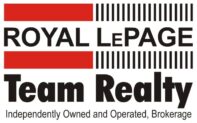
James Dean
Sales Representative
Royal LePage Team Realty
1335 Carling Avenue
Ottawa, Ontario
K1Z 8N8
Office: 613-725-1171
Direct: 613-293-2088
Fax: 613-725-3323
Toll Free: 1-800-307-1545
James@JamesDean.ca